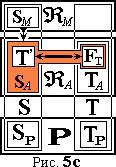If the contact is established and/or supported by subject's S mentalum component SM, then his attention becomes intentional (fig. 5c), but sharp, especially principle borders between them (all the three) are not present.
Control influences from SM can be directed oppositely against function of direct reflection Rd, can suppress it. These are cases of active avoiding of undesirable information. It can be admitted as antiattention [ 6A ]. So, a person can intentionally, volitionly turn himself away from something unpleasant. If reflection Rd is suppressed by subject's S astralum component SA, by his emotion, then the antiattention can be admitted as spontaneous.
| |  |
